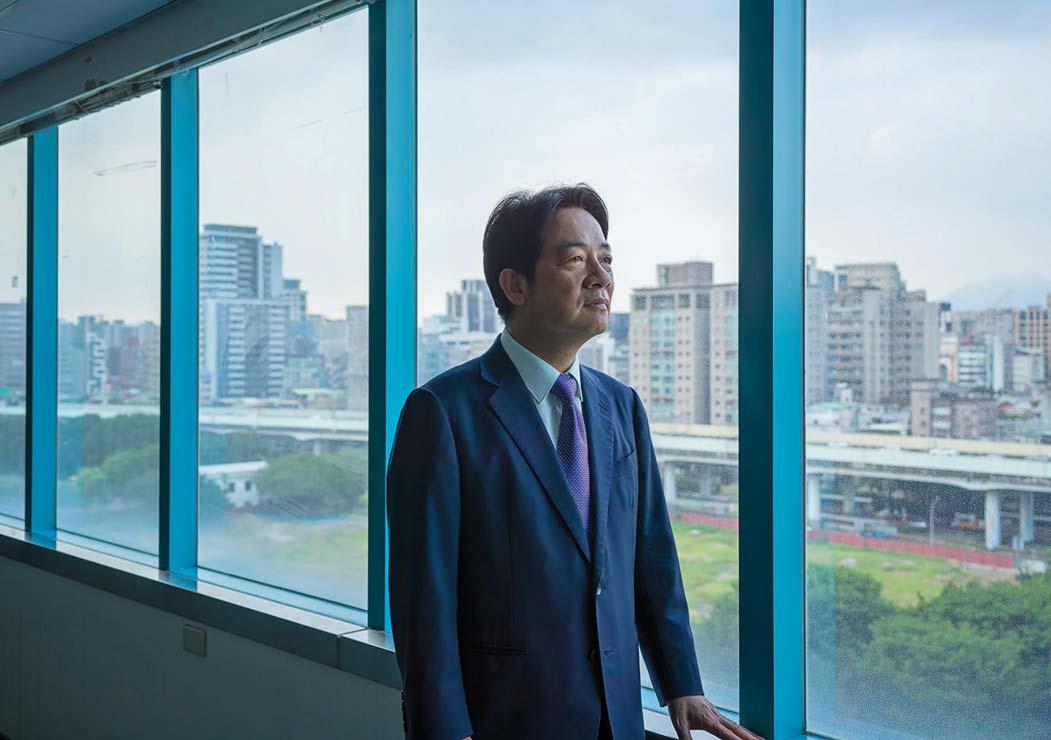Essayer OR - Gratuit
The delicate balance facing William Lai, Taiwan's presidential front runner
Time
|December 04, 2023
MORE THAN ONCE WHEN WILLIAM LAI WAS A small boy, a passing typhoon tore the roof of his home clean away. It's a recollection that brings a wry smile to Taiwan's Vice President, who grew up in the small coal-mining hamlet of Wanli perched on the island's far north.

His father died in an accident in the pits when Lai was just 2 years old, leaving his mother to raise six children alone. Money was tight. Instead of toys, Lai had banyan trees to climb; instead of new clothes, he wore castoffs; he didn't have privilege, he had to prove himself. Today, Lai, 64, is the front runner in Taiwan's January elections to replace outgoing President Tsai Ing-wen, who represents the same Democratic Progressive Party (DPP) but is ineligible to stand for a third term.
"One of the biggest assets my father left me was being impoverished," Lai tells TIME in an interview in late October. "Because in this environment, I worked harder, more vigorously on everything I did. It gave me a sense of determination."
Two days after our conversation, Lai returned to Wanli on the campaign trail, where he was greeted with presumptive shouts of "Hello, President!" After lighting incense at a lantern-filled temple, Lai promised the assembled crowd he would improve transport links and health care facilities for seniors, before turning to more weighty concerns. "My first priority is to maintain stability in the Indo-Pacific region," Lai told a throng of farmers and crab fishermen.
Lai may not worry about typhoons these days, but geopolitical winds continue to batter the Taiwanese. Beijing considers the self-governing island of 23 million its sovereign territory and has vowed to reclaim it - by force if necessary. It remains the most combustive of the myriad squabbles that today define relations between the world's superpowers. On four occasions, President Joe Biden has vowed to protect Taiwan from Chinese military aggression. Lai knows war benefits nobody. "Taiwan hopes to be friends with China - we don't wish to be enemies," he says.
Cette histoire est tirée de l'édition December 04, 2023 de Time.
Abonnez-vous à Magzter GOLD pour accéder à des milliers d'histoires premium sélectionnées et à plus de 9 000 magazines et journaux.
Déjà abonné ? Se connecter
PLUS D'HISTOIRES DE Time

Time
CRISTIANO AMON
Qualcomm's CEO on gladiators, where AI will live, and taking on Nvidia
3 mins
January 16, 2026

Time
Menopausal women in revolt
In the early 1990s, young women raised on second-wave feminism but marginalized within the punk scene revolted. Dubbed riot grrrls, bands like Bikini Kill and Bratmobile aimed wrathful lyrics and gallows humor at a culture of misogyny as it manifested in their own lives, from condescending male musicians to abusive fathers. Now, those artists are in their 50s. And while sexism persists, it touches older women in different ways.
1 mins
January 16, 2026

Time
5 PREDICTIONS FOR AI IN 2026
The technology is poised for integration into everyday experience
2 mins
January 16, 2026

Time
AFRICA'S MINERAL MAKEOVER
Soaring demand for resources is reshaping Africa's ambitions— and place in the global order
13 mins
January 16, 2026

Time
WHY AREN'T WE USING AI TO ADVANCE JUSTICE?
Giving overlooked victims access to lawyers and courts
3 mins
January 16, 2026

Time
DECODING THE OVARY
SCIENTISTS ARE TARGETING THE ORGAN TO TRY TO SLOW DOWN AGING. WILL IT WORK?
12 mins
January 16, 2026

Time
KRISTALINA GEORGIEVA
The IMF managing director on the future of trade and AI
3 mins
January 16, 2026

Time
THE NEW OLD AGE
THE \"GOLDEN YEARS\" ARE GETTING AN UPGRADE
10 mins
January 16, 2026

Time
A Korean master dampens the power of a corporate thriller
THERE'S NO BETTER TIME FOR AN ADAPTATION of Donald E. Westlake's unsparing 1997 novel The Ax, which treats downsizing as a form of dehumanization. The bad news is that No Other Choice, the Ax adaptation Korean master Park Chan-wook has long wanted to make, isn't the picture Westlake's cold shiv of a novel deserves. As fine a filmmaker as Park is—his 2003 Oldboy is a chilly, operatic masterpiece—No Other Choice is too dully observed and too slapsticky to hit its mark. It's a missed opportunity dressed up with proficient filmmaking.
2 mins
January 16, 2026

Time
THE DREAM DEMANDS MORE
Have AI answer Dr. King's call for economic justice
2 mins
January 16, 2026
Translate
Change font size

